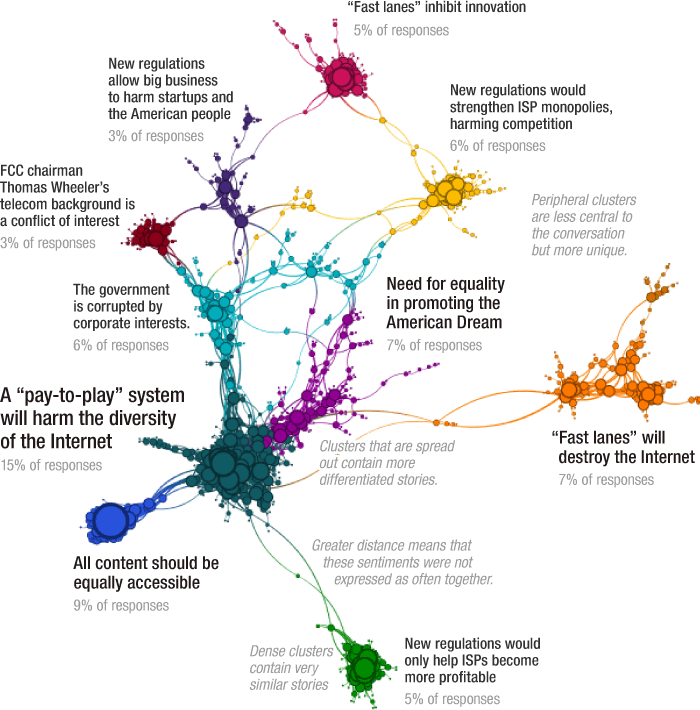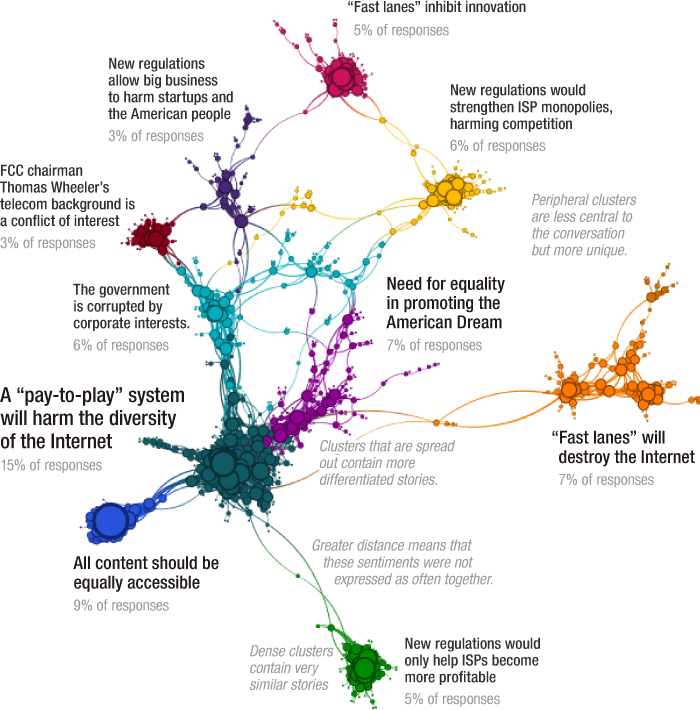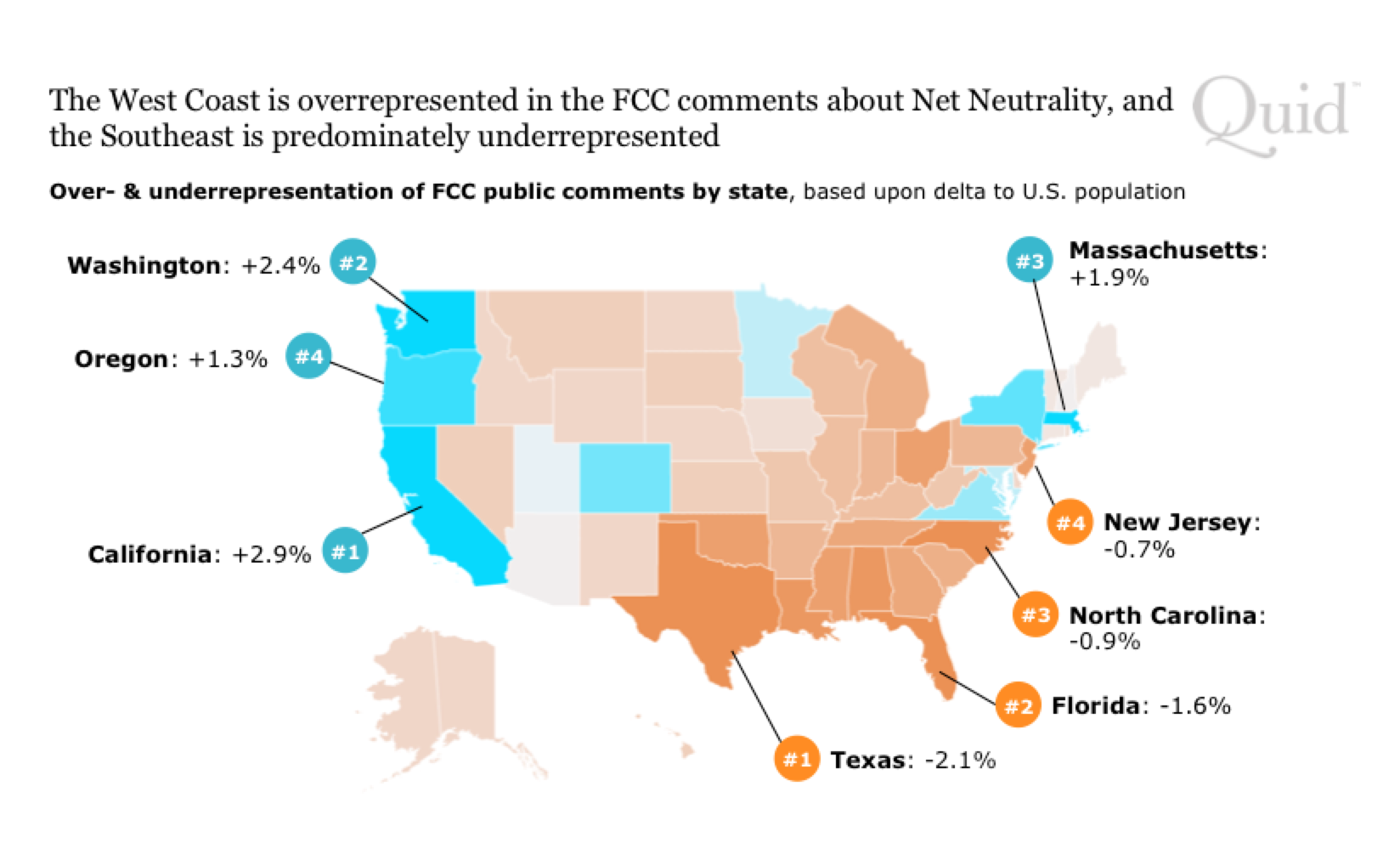Net neutrality? The FCC's public commenters were overwhelmingly in favor


A free daily email with the biggest news stories of the day – and the best features from TheWeek.com
You are now subscribed
Your newsletter sign-up was successful
The public debate over net neutrality isn't much of a debate, if the 1.1 million public comments on the Federal Communication Commission's proposed "open internet" rules are any guide. Wading through more than a million comments — the second-most the FCC has ever received on an issue, after the 1.4 million comments about Janet Jackson's 2004 wardrobe malfunction — is a daunting task. How do you make sense of that much data?
The Knight Foundation commissioned data visualization and analysis firm Quid to dig into the public comments and sift out common themes. Quid looked at a sample of 250,000 comments, then created this cluster map, shared via NPR's All Tech Considered:

(Quid, via NPR)
The Week
Escape your echo chamber. Get the facts behind the news, plus analysis from multiple perspectives.

Sign up for The Week's Free Newsletters
From our morning news briefing to a weekly Good News Newsletter, get the best of The Week delivered directly to your inbox.
From our morning news briefing to a weekly Good News Newsletter, get the best of The Week delivered directly to your inbox.
More than 30 percent of the comments were from letters or templates, primarily from five major advocacy groups — four in favor of net neutrality, one opposed — and Quid collapsed each template into one comment. The largest cluster of comments (15 percent) focused on how a pay-to-play system — proponents call it a fast-lane for web services willing to pay and a regular lane for everybody else — would harm the diversity of the internet.
But "taken with the entire body of comments sampled, there weren't enough unique or organic anti-net-neutrality comments to register on the map," explains NPR's Elise Hu.
The FCC's commenters are obviously a self-selected sample, and Quid also looked into their demographics. So, who are they? Men, mostly: Only 29 percent of the comments Quid studied appeared to be from women. And certain areas of the country were more prone to comment, as Quid shows in this map:

Historically, though, public comments don't have much impact on FCC rule-making, George Washington University law professor Richard Pierce told NPR in July. Data-rich input from industry sources is much more influential, he said, but there is a good way for the FCC commissioners to gauge the temperature of the country: "Take a look at things like public opinion polls," he said. "A public opinion poll is a far more reliable indicator of what the public thinks about an issue like net neutrality than a bunch of postcards or one-liners."
A free daily email with the biggest news stories of the day – and the best features from TheWeek.com
Peter has worked as a news and culture writer and editor at The Week since the site's launch in 2008. He covers politics, world affairs, religion and cultural currents. His journalism career began as a copy editor at a financial newswire and has included editorial positions at The New York Times Magazine, Facts on File, and Oregon State University.
-
 The Olympic timekeepers keeping the Games on track
The Olympic timekeepers keeping the Games on trackUnder the Radar Swiss watchmaking giant Omega has been at the finish line of every Olympic Games for nearly 100 years
-
 Will increasing tensions with Iran boil over into war?
Will increasing tensions with Iran boil over into war?Today’s Big Question President Donald Trump has recently been threatening the country
-
 Corruption: The spy sheikh and the president
Corruption: The spy sheikh and the presidentFeature Trump is at the center of another scandal
-
 Nobody seems surprised Wagner's Prigozhin died under suspicious circumstances
Nobody seems surprised Wagner's Prigozhin died under suspicious circumstancesSpeed Read
-
 Western mountain climbers allegedly left Pakistani porter to die on K2
Western mountain climbers allegedly left Pakistani porter to die on K2Speed Read
-
 'Circular saw blades' divide controversial Rio Grande buoys installed by Texas governor
'Circular saw blades' divide controversial Rio Grande buoys installed by Texas governorSpeed Read
-
 Los Angeles city workers stage 1-day walkout over labor conditions
Los Angeles city workers stage 1-day walkout over labor conditionsSpeed Read
-
 Mega Millions jackpot climbs to an estimated $1.55 billion
Mega Millions jackpot climbs to an estimated $1.55 billionSpeed Read
-
 Bangladesh dealing with worst dengue fever outbreak on record
Bangladesh dealing with worst dengue fever outbreak on recordSpeed Read
-
 Glacial outburst flooding in Juneau destroys homes
Glacial outburst flooding in Juneau destroys homesSpeed Read
-
 Scotland seeking 'monster hunters' to search for fabled Loch Ness creature
Scotland seeking 'monster hunters' to search for fabled Loch Ness creatureSpeed Read
